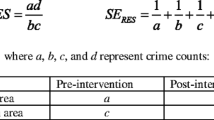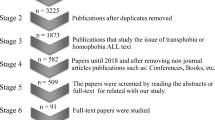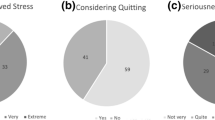Abstract
In recent years, increasing attention has been paid to police officers’ organisational commitment. This research paper contributes to this growing body of knowledge by investigating commitment amongst recent police recruits. The paper examines the extent to which new recruits’ existing knowledge of the police service prior to becoming an officer predicts organisational commitment, and different possible sources of this pre-entry knowledge. Using a sample of 236 recent police recruits in England and Wales, the study observed a significant relationship between recent recruits’ existing knowledge of the police service and their organisational commitment. Prior police work experience (both paid and voluntary) significantly predicted existing knowledge of the police service, and in turn organisational commitment. In comparison, pre-entry police training did not predict existing knowledge of the police service, and moreover was found to negatively predict organisational commitment. The implications of these findings are discussed in relation to proposed changes to recruitment and entry routes into policing in England and Wales.


Similar content being viewed by others
Notes
No statistically significant differences were seen between respondents on the basis of the type of pre-join training therefore pre-join training was treated as a single grouping variable.
A reverse paths model was also tested (i.e. with pre-join knowledge sources treated as outcome variables) and was found to have a poorer fit to the data than the hypothesised model χ2(6) = 8.34, p = .21; CFI = .93; NFI = .82; RMSEA = .03; CMIN/df = 1.39; AIC = 36.34).
References
Adkins CL (1995) Previous work experience and organizational socialization: a longitudinal examination. Acad Manag J 38(3):839–862
Allen NJ, & Meyer JP (1993). Organizational commitment: evidence of career stage effects?. J Bus Res 26(1):49–61.
Bagozzi RP, Yi Y, Phillips LW (1991) Assessing construct validity in organizational research. Adm Sci Q 36(3):421–458
Barrick MR, Zimmerman RD (2005) Reducing voluntary, avoidable turnover through selection. J Appl Psychol 90(1):159–166
Bauer TN, Green SG (1994) Effect of newcomer involvement in work-related activities: a longitudinal study of socialization. J Appl Psychol 79(2):211–223
Bauer TN, Bodner T, Erdogan B, Truxillo DM, Tucker JS (2007) Newcomer adjustment during organizational socialization: a meta-analytic review of antecedents, outcomes, and methods. J Appl Psychol 92(3):707–721
Beyer JM, Hannah DR (2002) Building on the past: enacting established personal identities in a new work setting. Organ Sci 13(6):636–652
Bradford B, Quinton P, Myhill A, Porter G (2014) Why do ‘the law’ comply? Procedural justice, group identification and officer motivation in police organizations. Eur J Criminol 11(1):110–131
Breaugh JA (1983) Realistic job previews: a critical appraisal and future research directions. Acad Manag Rev 8(4):612–619
Brunetto Y, Farr-Wharton R, Shacklock K (2011) Using the Harvard HRM model to conceptualise the impact of changes to supervision upon HRM outcomes for different types of Australian public sector employees. The International Journal of Human Resource Management 22(03):553–573
Brunetto Y, Teo ST, Shacklock K, Farr-Wharton R (2012) Emotional intelligence, job satisfaction, well-being and engagement: explaining organisational commitment and turnover intentions in policing. Hum Resour Manag J 22(4):428–441
Cable, D. M., & Turban, D. B. (2001). Establishing the dimensions, sources and value of job seekers' employer knowledge during recruitment. In: Research in personnel and human resources management (pp. 115–163). Emerald Group Publishing Limited, Bingley, UK.
Carless SA (2005). The influence of fit perceptions, equal opportunity policies, and social support network on pre-entry police officer career commitment and intentions to remain. J Crim Just 33(4):341–352
Carr JC, Pearson AW, Vest MJ, Boyar SL (2006) Prior occupational experience, anticipatory socialization, and employee retention. J Manag 32(3):343–359
Christopher S (2015) The quantum leap: police recruit training and the case for mandating higher education pre-entry schemes. Policing 9(4):388–404
College of Policing (2016a). Developing and delivering an education qualification framework for policing: the College of Policing response to the consultation. Available at http://www.college.police.uk/What-we-do/Learning/Policing-Education-Qualifications-Framework/Documents/PEQF_2016.pdf. Accessed 15 March 2017
College of Policing (2016b). Review of police initial recruitment. Final report with recommendations. Available at http://recruit.college.police.uk/Officer/Documents/Review_of_police_initial_recruitment_final_report.pdf#search=Initial%20recruitment. Accessed 15 March 2017
Cooper-Thomas H, Anderson N (2002) Newcomer adjustment: the relationship between organizational socialization tactics, information acquisition and attitudes. J Occup Organ Psychol 75(4):423–437
Crow MS, Lee CB, Joo JJ (2012) Organizational justice and organizational commitment among South Korean police officers: an investigation of job satisfaction as a mediator. Policing: Int J Police Strateg Manag 35(2):402–423
Currie P, Dollery B (2006) Organizational commitment and perceived organizational support in the NSW police. Policing:Int J Police Strateg Manag 29(4):741–756
Dick GP (2011) The influence of managerial and job variables on organizational commitment in the police. Public Adm 89(2):557–576
Dokko G, Wilk SL, Rothbard NP (2009) Unpacking prior experience: how career history affects job performance. Organ Sci 20(1):51–68
Eby LT, Freeman DM, Rush MC, Lance CE (1999) Motivational bases of affective organizational commitment: a partial test of an integrative theoretical model. J Occup Organ Psychol 72(4):463–483
Elliott-Davies, M. & Houdmont, J. (2017). Officer demand, capacity and welfare survey: descriptive statistics summary report—attitudes and evaluations. Available at http://www.polfed.org/documents/WelfareSurveyATTITUDESANDEVALUATION-SummaryReport-25-01-2017-V.1.pdf. Accessed 15 March 2017
Heslop R (2011) Reproducing police culture in a British university: findings from an exploratory case study of police foundation degrees. Police Pract Res 12(4):298–312
Holton EF III (1996) New employee development: a review and reconceptualization. Hum Resour Dev Q 7(3):233–252
Huber GP, Power DJ (1985) Retrospective reports of strategic-level managers: guidelines for increasing their accuracy. Strateg Manag J 6(2):171–180
Hur Y (2013) Turnover, voluntary turnover, and organizational performance: evidence from municipal police departments. Public Adm Q 37(1):3–35
Jaramillo F, Nixon R, Sams D (2005) The effect of law enforcement stress on organizational commitment. Policing: Int J Police Strateg Manag 28(2):321–336
Johnson RR (2015) Police organizational commitment: the influence of supervisor feedback and support. Crime & Delinq 61(9):1155–1180
Kammeyer-Mueller JD, Wanberg CR (2003) Unwrapping the organizational entry process: disentangling multiple antecedents and their pathways to adjustment. J Appl Psychol 88(5):779–794
Klein HJ, Fan J, Preacher KJ (2006) The effects of early socialization experiences on content mastery and outcomes: a mediational approach. J Vocat Behav 68(1):96–115
Kramer MW (2010) Organisational socialization: joining and leaving organizations. Polity Press, Cambridge
Kuo SY (2015) Occupational stress, job satisfaction, and affective commitment to policing among Taiwanese police officers. Police Quarterly 18(1):27–54
Lievens F, Hoye G, Schreurs B (2005) Examining the relationship between employer knowledge dimensions and organizational attractiveness: an application in a military context. J Occup Organ Psychol 78(4):553–572
Macvean A, Cox C (2012) Police education in a university setting: emerging cultures and attitudes. Policing 6(1):16–25
Marion N (1998) Police academy training: are we teaching recruits what they need to know? Policing: Int J Police Strateg Manag 21(1):54–79
McElroy JC, Morrow PC, Wardlow TR (1999) A career stage analysis of police officer work commitment. J Crim Just 27(6):507–516
Metcalfe B, Dick G (2000) Is the force still with you? Measuring police commitment. J Manag Psychol 15(8):812–832
Metcalfe B, Dick G (2001) Exploring organisation commitment in the police: implications for human resource strategy. Policing: Int J Police Strateg Manag 24(3):399–420
Meyer JP, Allen NJ (1991) A three-component conceptualization of organizational commitment. Hum Resour Manag Rev 1(1):61–89
Meyer JP, Bobocel DR, Allen NJ (1991) Development of organizational commitment during the first year of employment: a longitudinal study of pre-and post-entry influences. J Manag 17(4):717–733
Meyer JP, Allen NJ, Smith CA (1993) Commitment to organizations and occupations: extension and test of a three-component conceptualization. J Appl Psychol 78(4):538–551
Meyer JP, Stanley DJ, Herscovitch L, Topolnytsky L (2002) Affective, continuance, and normative commitment to the organization: a meta-analysis of antecedents, correlates, and consequences. J Vocat Behav 61(1):20–52
Moon MM, Jonson CL (2012) The influence of occupational strain on organizational commitment among police: a general strain theory approach. J Crim Just 40(3):249–258
Moreland RL, Levine JM (2001) Socialization in organizations and work groups. In: Turner ME (ed) Groups at work: theory and research. Routledge, London, pp 69–112
Morris A, Shinn M, DuMont K (1999) Contextual factors affecting the organizational commitment of diverse police officers: a levels of analysis perspective. Am J Community Psychol 27(1):75–105
Orrick WD (2002) Calculating the cost of police turnover. Police Chief 69(10):100–103
Ostroff C, Kozlowski SW (1992) Organizational socialization as a learning process: the role of information acquisition. Pers Psychol 45(4):849–874
Pepper I (2014) Do part-time volunteer police officers aspire to be regular police officers? Police J 87(2):105–113
Phillips JM (1998) Effects of realistic job previews on multiple organizational outcomes: a meta-analysis. Acad Manag J 41(6):673–690
Porter LW, Steers RM, Mowday RT, Boulian PV (1974) Organizational commitment, job satisfaction, and turnover among psychiatric technicians. J Appl Psychol 59(5):603–609
Quinones MA, Ford JK, Teachout MS (1995) The relationship between work experience and job performance: a conceptual and meta-analytic review. Pers Psychol 48(4):887–910
Richardsen AM, Burke RJ, Martinussen M (2006) Work and health outcomes among police officers: the mediating role of police cynicism and engagement. Int J Stress Manag 13(4):555–574
Riketta M (2002) Attitudinal organizational commitment and job performance: a meta-analysis. J Organ Behav 23(3):257–266
Riordan CM, Weatherly EW, Vandenberg RJ, Self RM (2001) The effects of pre-entry experiences and socialization tactics on newcomer attitudes and turnover. J Manag Issues 13(2):159–176
Rodwell JJ, Noblet AJ, Allisey AF (2011) Improving employee outcomes in the public sector: the beneficial effects of social support at work and job control. Pers Rev 40(3):383–397
Rynes SL, Orlitzky MO, Bretz RD (1997) Experienced hiring versus college recruiting: practices and emerging trends. Personnel Psychology 50(2):309–339
Simosi M (2010). The role of social socialization tactics in the relationship between socialization content and newcomers' affective commitment. J Manag Psychol 25(3):301–327
Tannenbaum SI, Mathieu JE, Salas E, Cannon-Bowers JA (1991) Meeting trainees’ expectations: the influence of training fulfillment on the development of commitment, self-efficacy, and motivation. J Appl Psychol 76(6):759–769
Truxillo DM, Bennett SR, Collins ML (1998) College education and police job performance: a ten-year study. Public Personnel Manag 27(2):269–280
Van Maanen J, Schein EH (1979) Toward a theory of organisational socialisation. In: Staw MB, Cummings LL (eds) Research in organisational behavior, vol 1. JAI Press, Greenwich
Vandenberg RJ, Scarpello V (1990) The matching model: an examination of the processes underlying realistic job previews. J Appl Psychol 75(1):60–67
Wanous JP (1973) Effects of a realistic job preview on job acceptance, job attitudes, and job survival. J Appl Psychol 58(3):327–332
Wanous JP, Poland TD, Premack SL, Davis KS (1992) The effects of met expectations on newcomer attitudes and behaviors: a review and meta-analysis. J Appl Psychol 77(3):288–297
Author information
Authors and Affiliations
Corresponding author
Ethics declarations
Conflict of Interest
The authors declare that they have no conflict of interest.
Ethical Approval
All procedures performed in studies involving human participants were in accordance with the ethical standards of the institutional and/or national research committee and with the 1964 Helsinki declaration and its later amendments or comparable ethical standards.
Informed Consent
Informed consent was obtained from all individual participants included in the study.
Rights and permissions
About this article
Cite this article
Boag-Munroe, F. Recent Police Recruits’ Existing Knowledge of the Police and Organisational Commitment. J Police Crim Psych 34, 91–101 (2019). https://doi.org/10.1007/s11896-018-9273-1
Published:
Issue Date:
DOI: https://doi.org/10.1007/s11896-018-9273-1




